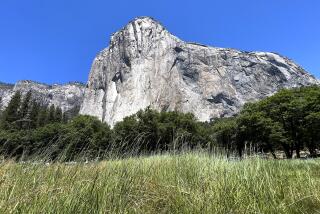Classic Hollywood: Diaries of Charles Brackett lift curtain on Hollywood’s Golden Era
- Share via
In screenwriter Charles Brackett’s diary entry for Aug. 18, 1936, he recalls working for the first time with Billy Wilder, with whom Paramount had paired him to write the comedy “Bluebeard’s Eighth Wife.”
“Worked with Billy Wilder, who paces constantly, has over-extravagant ideas, but is stimulating,” Brackett writes. “He has humor — a kind of humor that sparks with mine.”
And thus began one of the most successful collaborations in film history. Brackett and Wilder penned several classic films, including director Ernst Lubitsch’s 1938 “Bluebeard’s Eighth Wife” and 1939 romantic comedy “Ninotchka,” and Howard Hawks’ 1941 comedy “Ball of Fire.” Wilder took over the directorial reins on their projects beginning with the 1942 comedy “The Major and the Minor.” The collaborators had received screenwriting Oscars for “Sunset Boulevard” and for the 1945 film “The Lost Weekend,” awards they shared with D.M. Marshman Jr.
A new book of his diaries from 1932 to ‘49, “It’s the Pictures That Got Small: Charles Brackett on Billy Wilder and Hollywood’s Golden Age,” edited by Anthony Slide, offers not only rare insight into their often-stormy partnership but also an insider’s view of Hollywood during that era.
Slide will be on hand Sunday at the UCLA Film & Television Archive’s celebration of Brackett at the Billy Wilder Theater. Screening that evening are “The Lost Weekend” and the 1943 World War II drama “Five Graves to Cairo.”
“I don’t think anybody else documented Hollywood in this way,” Slide said. “Nobody kept a diary year after year. He was a literary figure anyway. He had written short stories for the Saturday Evening Post and had written a number of novels. But I think when he came out to Hollywood, he sort of thought, ‘Maybe I should keep a diary.’”
The diaries could be devastatingly funny, like the Aug. 2, 1934, entry about a dinner at director James Whale’s house attended by Charles Laughton and his wife, Elsa Lanchester.
“Laughton is the most repellent human being with whom I have ever had to share a table and the most incredible self-caricatured ham,” Brackett muses.
Brackett and Wilder couldn’t have been more different. Brackett, who was born in Saratoga Springs, N.Y., graduated from Harvard. He was a rock-ribbed Republican who voted for Herbert Hoover in 1932 (Franklin Roosevelt won by a landslide) and Alf Landon in 1936. He was nearly 14 years Wilder’s senior.
Wilder had fled Germany when the Nazis came to power and was as liberal as Brackett was conservative.
“Brackett was someone who could take Wilder’s international European sensibilities and make them legible to American audiences,” said Shannon Kelley, the archive’s head of programming. “He made Wilder essentially credible as an American player.”
Slide noted that although Brackett and Wilder were on the opposite ends of the political spectrum, “they do get on together on the whole.
“When, for example, Billy Wilder has to go down to immigration because there is problem with his papers, who does he take with him? He takes Charles Brackett because he knows Charles Brackett will support him.”
Brackett’s grandson Jim Moore wrote the foreword to the book and donated the diaries to the Academy of Motion Picture Arts and Sciences. (Brackett, who died in 1969, continued to write diaries through 1962.)
“I think the sad thing in a way is people always tend to look at their films as Billy Wilder films rather than Brackett and Wilder films,” Slide said. “Even though Wilder may have directed those films, they were co-written with Brackett, and Brackett was the producer, so they were bringing an equal amount of creativity to the project. They worked as a team. They complemented each other.”
And they seemed to understand each other’s minds, Slide said, especially when they were thinking of having long-retired Mary Pickford play Norma Desmond in “Sunset Boulevard.”
Brackett writes about their meeting at her legendary Beverly Hills mansion, Pickfair, on Dec. 7, 1948:
“She came in a dark blue dress with great diamond clips and diamond bracelets, which she pulled off after a time. She sat on a couch facing us, in full light of the sun, looking remarkably young and quite wicked. We told the story and she said it was very interesting and she’d think it over and let us know tomorrow. We both knew with relief that the answer was ‘No.’”
Twitter: @mymackie
------------------------------
‘Celebrating Charles Brackett’
Who: UCLA Film & Television Archive
Where: Billy Wilder Theater, 10899 Wilshire Blvd., Los Angeles
When: 7 p.m. Sunday
Admission: $10
Info: https://www.cinema.ucla.edu
More to Read
Only good movies
Get the Indie Focus newsletter, Mark Olsen's weekly guide to the world of cinema.
You may occasionally receive promotional content from the Los Angeles Times.











